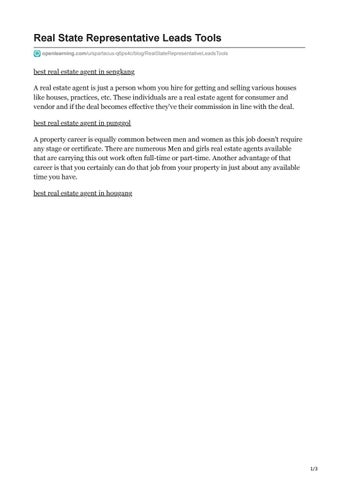
A reciprocal license for real estate is a way to allow a licensed real estate agent from one state to get a license in another. Although it is different from one state or another, there are some general guidelines that will help. They include an active license in real estate and a good understanding of the state-specific legislation.
Many states have different portability laws. Some permit the transfer of licenses between states, while others don't have such programs. For more information, contact the real estate commission in your state.
A license as a realty agent in another state can make your job much easier. However, there are some challenges. First, your license must still be valid in your state. You may also need to pass a multi-state exam in real estate or the state-specific section of a national exam. Finally, you may need help with any disciplinary actions you may face in your home-state.

The benefits of obtaining a reciprocal real estate license are numerous. One example is that you can focus solely on state-specific legislation and skip the general realty classes. Referring clients to another agent/broker is possible if you're a NuOp service. Before you can apply to a reciprocal license, however, you must be familiar with the laws and regulations in both states.
As with many state requirements, the requirements are a bit more complex for those who plan to move to a new state. If you're moving to South Dakota, for instance, you'll need to pass the South Dakota state-specific examination and prove that your current license is in good standing in your home state. Other requirements may include a few hours of state-specific training.
Visit the Ohio Department of Commerce website to see a complete list of reciprocal license programs. There is also a website dedicated to the Delaware Real Estate Commission. The DC Department of Consumer and Regulatory Affairs holds reciprocal licenses with several states.
You can obtain a license to be a real-estate agent in Alaska if your license is valid from another state. To be eligible for the Alaska-specific real estate license, you will need pass both the state and the national sections of the exam. A six-hour Alaska-specific course is also required.

Real estate licenses from non-reciprocal states are generally only available to permanent residents. You should check with your state’s real estate commission if they have a reciprocal system. Some states even have limited reciprocity agreements which allow licensed agents to transfer their licenses to other states.
Overall, real estate license reciprocity is a great way to speed up the process of getting a license in a new state. Whether you're moving to Colorado, Nevada, or any of the other states offering reciprocal real estate licenses, you'll need to follow their rules.
FAQ
Is it better to buy or rent?
Renting is generally cheaper than buying a home. It is important to realize that renting is generally cheaper than buying a home. You will still need to pay utilities, repairs, and maintenance. There are many benefits to buying a home. For example, you have more control over how your life is run.
How much will my home cost?
It depends on many factors such as the condition of the home and how long it has been on the marketplace. The average selling price for a home in the US is $203,000, according to Zillow.com. This
What is reverse mortgage?
Reverse mortgages allow you to borrow money without having to place any equity in your property. It works by allowing you to draw down funds from your home equity while still living there. There are two types of reverse mortgages: the government-insured FHA and the conventional. You must repay the amount borrowed and pay an origination fee for a conventional reverse loan. FHA insurance will cover the repayment.
What are the chances of me getting a second mortgage.
Yes. However it is best to seek the advice of a professional to determine if you should apply. A second mortgage is used to consolidate or fund home improvements.
Is it possible for a house to be sold quickly?
It may be possible to quickly sell your house if you are moving out of your current home in the next few months. There are some things to remember before you do this. First, you need to find a buyer and negotiate a contract. Second, prepare your property for sale. Third, advertise your property. You should also be open to accepting offers.
What are the three most important factors when buying a house?
The three main factors in any home purchase are location, price, size. Location is the location you choose to live. Price refers the amount that you are willing and able to pay for the property. Size refers to the space that you need.
Can I buy my house without a down payment
Yes! Yes. There are programs that will allow those with small cash reserves to purchase a home. These programs include government-backed loans (FHA), VA loans, USDA loans, and conventional mortgages. For more information, visit our website.
Statistics
- 10 years ago, homeownership was nearly 70%. (fortunebuilders.com)
- This means that all of your housing-related expenses each month do not exceed 43% of your monthly income. (fortunebuilders.com)
- Some experts hypothesize that rates will hit five percent by the second half of 2018, but there has been no official confirmation one way or the other. (fortunebuilders.com)
- Based on your credit scores and other financial details, your lender offers you a 3.5% interest rate on loan. (investopedia.com)
- The FHA sets its desirable debt-to-income ratio at 43%. (fortunebuilders.com)
External Links
How To
How to buy a mobile home
Mobile homes can be described as houses on wheels that are towed behind one or several vehicles. They have been popular since World War II, when they were used by soldiers who had lost their homes during the war. People today also choose to live outside the city with mobile homes. These homes are available in many sizes and styles. Some are small, while others are large enough to hold several families. Even some are small enough to be used for pets!
There are two main types of mobile homes. The first is built in factories by workers who assemble them piece-by-piece. This process takes place before delivery to the customer. You can also build your mobile home by yourself. Decide the size and features you require. You will need to make sure you have the right materials for building the house. Finally, you'll need to get permits to build your new home.
If you plan to purchase a mobile home, there are three things you should keep in mind. First, you may want to choose a model that has a higher floor space because you won't always have access to a garage. If you are looking to move into your home quickly, you may want to choose a model that has a greater living area. You should also inspect the trailer. Problems later could arise if any part of your frame is damaged.
You should determine how much money you are willing to spend before you buy a mobile home. It is important to compare prices across different models and manufacturers. It is important to inspect the condition of trailers. There are many financing options available from dealerships, but interest rates can vary depending on who you ask.
It is possible to rent a mobile house instead of buying one. Renting allows for you to test drive the model without having to commit. Renting is expensive. The average renter pays around $300 per monthly.